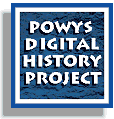
Background information
Out in the community
The 'Roadshows'
Working with local communities was central to what the project
was all about. In particular we wanted to give local people the
opportunity to contribute without having to travel all the way
to the record office in Llandrindod Wells. With this in mind
we organised a series of "roadshows" around the county.
We arranged around a dozen sessions, although they were all very
different.
Sometimes we were at a community centre
at the invitation of an organisation where we gave an illustrated
talk with the "roadshow" element afterwards, at other
times we held them as "drop-in" sessions in the local
libraries. Attendance at the organised events ranged from 20-50
persons at a time, with most people there as mere spectators,
however; in the course of an evening or afternoon at a library,
we got around 6-8 people actually bringing in material for us
to scan. Materials included: family photographs, postcards,
newspaper cuttings, medals, ephemera, and a few archival records
, e.g. from local businesses, and local history notes compiled
by individuals but not previously published.
Local people would normally hand the items to us to scan on site,
or in some cases to take away, scan, and return to them; however,
two individuals actually "burned" cd-roms for us full
of local images for us to use, and one offered to send us material
by e-mail (though this was not a success for technical reasons!).
Interestingly, it was some of the more senior members of the
communities who embraced this new technology.
What have we learned? Using the libraries was very helpful as a familiar environment, as both we and the technology were unfamiliar to many of the local people: the local Branch Library providing a more relaxed environment than perhaps a telecentre would. We were also careful to have images of each locality loaded on a laptop, so that we could show something relevant to local experience and to encourage discussion.
Finally, the response time of local groups and individuals in rural areas is naturally slow - a year was not really long enough, as in some cases news of the project has to spread by "word of mouth" (ironically!): we have found that we have started a momentum which we could have exploited more effectively NOW - but the funding has run out! In addition we could perhaps have exploited the Millennium more, at a time when much community activity is focusing on the future.